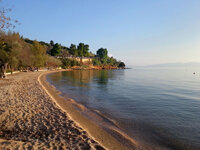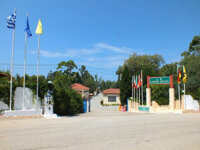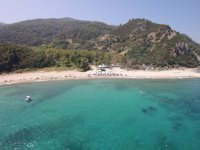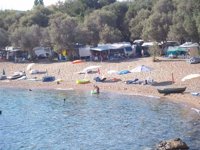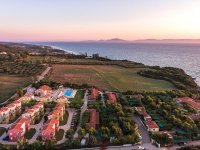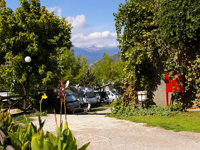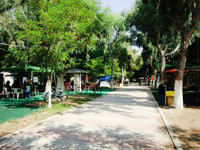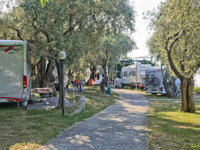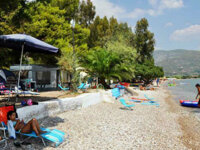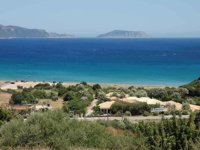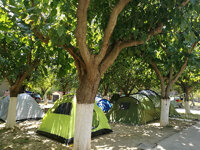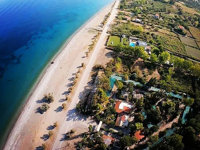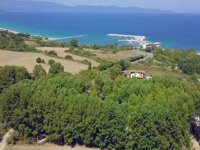Camping in Greece
53 campsites in Greece
Campsite Listing Google Map
The following consent is required:
Tracking & performance, Targeting & advertising.
Greece
Greece and its islands have a long legacy of art, music and literature. Since the days of Homer, its beauty has been celebrated: the azure of the Aegean Sea, the iridescent morning light and the grand marble temples.
Campsites in Greece are scattered across the country from the north, where keen hikers can climb Mount Olympus, to Crete, where the mythical minotaur lived under the palace at Knossos, which tourists can still visit. Athens is, of course, a popular destination with its ancient acropolis and charismatic atmosphere.
The island's clear waters and white sands make them highly popular with holidaymakers and ideal for watersports enthusiasts. Camping in Greece is a great chance to do a spot of island hopping – it's a leisurely way to fully explore what each place offers while soaking up the sun and sampling the local seafood.
Camping in Greece guarantees a relaxing break with plenty of culture for those who want it. Start your search with Alan Rogers and refine your results by region or theme for specific locations.
Unknown matrix block type: tableOfContents2!

Basic Information
Capital Athens
Currency Euro (EUR)
Language(s) Greek
Time Zones EET(UTC+2)
Summer (DST) EEST (UTC+3)
Telephone Code +30
Units Metric
EU Member Yes
Schengen Area Yes
Tourism Website www.visitgreece.gr
Greece is a member of the European Union, and customs inspections are occasionally conducted on individuals and vehicles crossing the border to ensure compliance with Greek regulations.
Shopping

In Greece, you'll find shops galore, from mini-markets and little shops with traditional products to designer boutiques in cosmopolitan Greek islands and cities such as Athens, Santorini, Mykonos, Rhodes, Kos, Corfu, Kefalonia, Lefkada and more.
You'll find vintage treasures galore in Greece, especially in the big Greek cities such as Athens and Thessaloniki. Antiques include furniture, art pieces, vintage objects, ornaments and everything you can imagine. Most of the antique shops in Greece are hidden in the heart of the big city centres. So you'll also have the chance to explore Greece's urban culture!
Since Greece has plenty of rich local produce, shops on the mainland and islands are everywhere. You will find Handmade objects, local delicacies, herbs, traditional remedies, olive oil and wine. You will also discover many types of handmade jewellery made from various materials, such as gold, silver, copper and gemstones. Earthenware and pottery are something you can find everywhere in Greece, including the islands such as Sifnos, Paros and Rhodes. They are famous for their beautiful and sophisticated ceramics, tea cups, plates and ornaments.
Shopping in Greece is an all-day-long activity. Shops are usually open from 9 a.m. until late in the evening. In tourist islands, most souvenir shops typically stay open until late. Souvenir shops are the most common in Greece, where you can buy Greek souvenirs and local products to remind you of your holiday.
Money in Greece
Greece uses the euro as its official currency. It is advised to carry some cash, but ATMs are readily available in almost all towns and cities, and many have multilingual instructions. Even the smaller islands usually have at least one ATM.
Public Holidays in Greece
- New Year's Day: 1st January
- Epiphany: 6th January
- Clean Monday (Shrove Monday), Good Friday, Great Saturday, Easter, Easter Monday, Pentecost & Holy Spirit Monday (7 weeks after Easter)
- Greek Independence Day: 25th March
- Protomagia: 1st May
- Holy Spirit Monday: 5th June
- Dormition of the Virgin Mary: 15th August
- National Anniversary Day: 28th October
- Christmas Day: 25th December
- Synaxis of the Mother of God: 26th December
Please note Some dates are moveable, so please check before travelling.
Driving in Greece
Visitors to Greece who wish to drive in the country must comply with the following requirements:
- A valid driver's license: Visitors must have a valid driver's license from their home country.
- Car insurance: Visitors must have valid car insurance for their vehicle, covering both the driver and passengers.
- Road rules: In Greece, motorists drive on the right and overtake on the left. Overtaking is forbidden on and approaching level crossings or if the vehicle ahead has stopped for safety reasons. The use of seat belts is mandatory for all occupants of a vehicle. Visitors must follow traffic laws, including speed limits, traffic signals, and road signs. On mountain roads, ascending traffic has priority.
- Unless your headlights can be adjusted, it's a legal requirement to carry headlamp converters (stickers for your headlights when driving on the right, so your lights don't dazzle motorists coming the other way).
- Safety equipment: Warning Triangle to be used in the event of your vehicle breaking down to warn other drivers, First aid kit, Fire extinguisher and reflective jacket.
- Minimum driving age: The minimum driving age in Greece is 18 years old.
- Alcohol law: The drink-drive limit for all drivers is 0.05%.
- Cars with caravans or trailers are not allowed to exceed 18 metres in length, 4 metres in height and 2.55 metres in width.
- The use of headphones is prohibited. Drivers are prohibited from holding a mobile phone while driving, but hands-free calling is allowed.
Greece Emergency Services
- General emergency number: 112
- Fire Service: 199
- Ambulance service: 166
- Police (Non-Emergency): 100
- Tourist Police: 171
- Coast Guard: 108
- Forest Fire Service: 1591
Weather in Greece
ATHENS WEATHERGreece's typical Mediterranean climate lends itself to mild and often wet winters and dry summers. The country is mostly sunny throughout the year. The northern part of the country can be freezing during the winters, even receiving snow in some areas. Winter is milder in the south.
Athens: Greece's capital has a Mediterranean climate with hot and dry summers and sometimes cold and wet winters. Temperatures average 29°C in August but can exceed 38°C, making it the hottest capital city in Europe.
Santorini: The famous island has a semi-arid climate with warm weather from May through September. It's also extremely dry; you can expect very little rainfall during the summer months. Winters are cool but not freezing - temperatures average around 13°C.
Thessaloniki: This port city has a Mediterranean climate but experiences much greater temperature variations than other parts of the country, with winter temperatures occasionally dropping as low as -9°C and snow falling on the northern plains. The city receives almost 300 days of sunshine per year.
Corfu: This island in the Ionian Sea is still warm and dry during the summer but receives much more precipitation during winter than Santorini and other popular islands. Because of this, Corfu is covered with much more lush vegetation than other parts of Greece. Winters can be cloudy but rarely cold.

